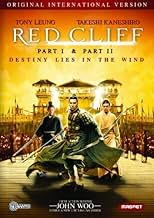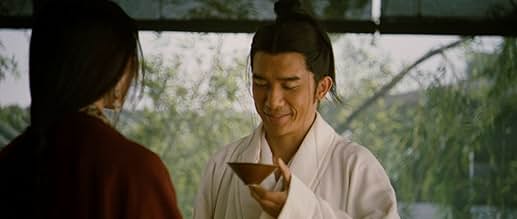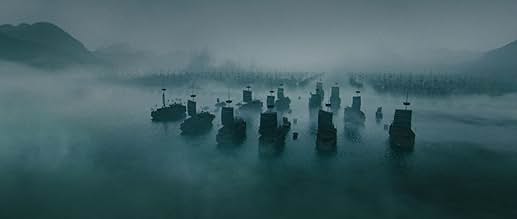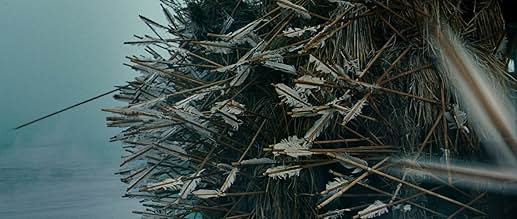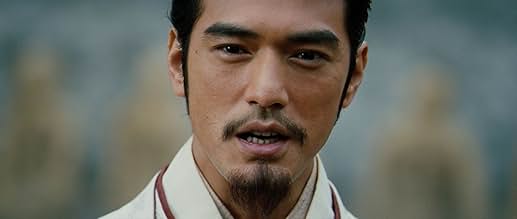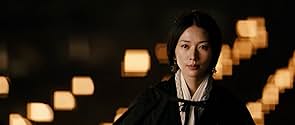Chi bi: Jue zhan tian xia
- 2009
- 2 Std. 22 Min.
IMDb-BEWERTUNG
7,5/10
26.051
IHRE BEWERTUNG
Zweiter und letzter Teil einer epischen Erzählung über eine legendäre Schlacht, die den Verlauf der chinesischen Geschichte veränderte.Zweiter und letzter Teil einer epischen Erzählung über eine legendäre Schlacht, die den Verlauf der chinesischen Geschichte veränderte.Zweiter und letzter Teil einer epischen Erzählung über eine legendäre Schlacht, die den Verlauf der chinesischen Geschichte veränderte.
- Auszeichnungen
- 8 Gewinne & 20 Nominierungen insgesamt
Tony Leung Chiu-wai
- Zhou Yu
- (as Tony Chiu Wai Leung)
Nicole Dionne
- Xiao Qiao
- (Synchronisation)
Empfohlene Bewertungen
With the cast established, their motivations solidified, the stage set and the first volleys already thrown in the original, John Woo is able to just sit back, relax, and make the thoroughly indulgent epic action picture he always wanted in its sequel. Where the first film thematically leans more in the direction of theology and politics, backed by a brief taste of large-scale military maneuvers, this follow-up is a full-gale blast of battlefield planning and dramatic execution. History buffs may grimace at a few of its flashier moments, like the warrior who uses his spear to pole vault over enemy battalions, but those are rare enough to write off as passing fits of eccentricity from a director who's not always known for his realism. Besides, the real sizzle lies with the world-class, hour long battle scene that closes the picture - and the obscene amount of fascinating war maneuvers seen therein. It's the mother of all fight scenes, an intense, unrelenting thrill ride the likes of which hasn't been seen from the west in decades, if ever. And, as Woo addresses one of my biggest complaints about the first Red Cliff - the generic, evil-for-the-fun-of-it enemy commander who's admirably rounded out in a few powerful scenes - it's ultimately an even better effort than its predecessor. A thrilling, intense, large-scale classic that makes for one hell of a payoff.
First of all, the cinematic in both Chi Bi I and II are amazing. Colors and sceneries are stunning. Battle scenes from the ships burning to blood spilling off of the cold steel of Zhao Yun's lance are unprecedented in Chinese films. Also, the computer graphics in the movie is a big step up from Chen Kaige's Wu Ji (The Promise 2005).
Other than the visual component of the movie, everything else is unfortunately a failure. I have been been anticipating the movies since late 2007. There had been a trend of Chinese movies trying to mimic Hollywood and impress westerners. I was hoping that Chi Bi would turn out to be an eastern epic of its own since it is based on one of the greatest battles within 4500 years of Chinese history. Yet after being very unsatisfied with the first movie, Chi Bi II: Jue Zhan Tian Xia was even more disappointing. Here are 4 reasons why it was a failure:
1)Characters: Other than Zhuge and Zhou Yu who were depicted in details, most other characters were very one-dimensional. For example, Cao Cao was portrayed as an arrogant, ambitious, and brutal man who makes his own decisions. In the movie, he became the all powerful villain that everyone feared. However, Cao Cao in the story was supposed to be very intelligent, benevolent at times and Charismatic, with many brilliant advisors he often took suggestions from. Not only did Cao Cao give me the impression of Xerxes in 300, it erased other sides of his personalities which made him interesting. Furthermore, John Woo failed to portray Liu Bei as a powerful man who would rise to be the ruler of one of the three kingdoms. In Chi Bi II, he delivered the impression of man who feared death who even had trouble inspiring his own men.
2)Hasty Modification of the Plot: In order to fit most of the key events leading up to the battle within a series of two films, many events were simplified or re-written. For example, Pang Tong - one of the most intelligent characters in the original book was cut out from movie. Instead of his phony surrender to Cao Cao and proposing the method of linking the ships together, it was simplified to a short dialog between Admiral Cai informing Cao Cao of his decision to link the ships. Also, Zhou Yu punishing his general Huang Gai with one hundred back lashes to deceive Cao Cao for the reason of Huang Gai's surrender was modified into Xiao Qiao's (Zhou Yu's Wife) decision of seducing Cao Cao to stall time. Furthermore, themes with Zhuge "borrowing the wind", Cao Cao's escape in Hua Rong Dao were reduced to a prolonged battle scene. With so many events holding great significance which contributes to the ultimate miracle at Chi Bi cut out, the plot of the movie became very predictable, unimpressive, and even confusing.
3)Very One Sided, Zhou Yu in Super Hero Mode: Zhou Yu was supposed to be the mastermind commander behind Sun Quan's army, but with average ability to combat. Yet, in the movie, Zhou Yu was chopping away in tens and thousands of soldiers like Achilles to save his wife. In fact, it was more like a gang of super heroes (Liu, Guan, Zhang, Zhao, Sun)unstoppable against Cao Cao's army. Ironically, none of them actually fought at Chi Bi, it was fought by their generals who were never mentioned. In the original story, Cao Cao also brought with him his best generals (Xiahou Yuan, Zhang Liao, Xu Chu, Xu Huang, Zhang He...etc) who were intelligent and were extremely skilled warriors. Neither were they mentioned. It made the battle seem less dramatic because Cao Cao's men were almost like obsoletes. Cao Cao's generals were portrayed as clueless cowards who hid behind the fences.
4) Misleading Scenes and Redundancy: John Woo put his main focus on the characters of Zhou and Zhuge portraying their friendship and intelligence, which totally missed the point of the intricacy of their alliance. Zhou was constantly jealous of Zhuge's intelligence, and was trying to find every reason to kill him. In fear that Zhou Yu would prevent Liu Bei from becoming a power, Zhuge was also working to protect his master Liu. John Woo's attempt to expand on Zhuge's character with the scene of him delivering a baby horse in the first movie was totally unnecessary, in fact it was absurd. As if there is no one else who knew how to deliver baby horses within the entire army.
Chi Bi Zhi Zhan (Battle of Chi Bi) was between Cao Cao's army of close to one million against 50,000 combined forces of Liu and Sun. The victory was supposed to be a miracle. It was the combination of strategies, weather, geography, from intricate planning. Yet John Woo made it a two men show of Zhuge and Zhou. The over simplification was ultimately resulted in disappointment. It leaves the wrong impression on those who does not know about the story. Overall, Chi Bi had good material to work with, but ended in failure.
Other than the visual component of the movie, everything else is unfortunately a failure. I have been been anticipating the movies since late 2007. There had been a trend of Chinese movies trying to mimic Hollywood and impress westerners. I was hoping that Chi Bi would turn out to be an eastern epic of its own since it is based on one of the greatest battles within 4500 years of Chinese history. Yet after being very unsatisfied with the first movie, Chi Bi II: Jue Zhan Tian Xia was even more disappointing. Here are 4 reasons why it was a failure:
1)Characters: Other than Zhuge and Zhou Yu who were depicted in details, most other characters were very one-dimensional. For example, Cao Cao was portrayed as an arrogant, ambitious, and brutal man who makes his own decisions. In the movie, he became the all powerful villain that everyone feared. However, Cao Cao in the story was supposed to be very intelligent, benevolent at times and Charismatic, with many brilliant advisors he often took suggestions from. Not only did Cao Cao give me the impression of Xerxes in 300, it erased other sides of his personalities which made him interesting. Furthermore, John Woo failed to portray Liu Bei as a powerful man who would rise to be the ruler of one of the three kingdoms. In Chi Bi II, he delivered the impression of man who feared death who even had trouble inspiring his own men.
2)Hasty Modification of the Plot: In order to fit most of the key events leading up to the battle within a series of two films, many events were simplified or re-written. For example, Pang Tong - one of the most intelligent characters in the original book was cut out from movie. Instead of his phony surrender to Cao Cao and proposing the method of linking the ships together, it was simplified to a short dialog between Admiral Cai informing Cao Cao of his decision to link the ships. Also, Zhou Yu punishing his general Huang Gai with one hundred back lashes to deceive Cao Cao for the reason of Huang Gai's surrender was modified into Xiao Qiao's (Zhou Yu's Wife) decision of seducing Cao Cao to stall time. Furthermore, themes with Zhuge "borrowing the wind", Cao Cao's escape in Hua Rong Dao were reduced to a prolonged battle scene. With so many events holding great significance which contributes to the ultimate miracle at Chi Bi cut out, the plot of the movie became very predictable, unimpressive, and even confusing.
3)Very One Sided, Zhou Yu in Super Hero Mode: Zhou Yu was supposed to be the mastermind commander behind Sun Quan's army, but with average ability to combat. Yet, in the movie, Zhou Yu was chopping away in tens and thousands of soldiers like Achilles to save his wife. In fact, it was more like a gang of super heroes (Liu, Guan, Zhang, Zhao, Sun)unstoppable against Cao Cao's army. Ironically, none of them actually fought at Chi Bi, it was fought by their generals who were never mentioned. In the original story, Cao Cao also brought with him his best generals (Xiahou Yuan, Zhang Liao, Xu Chu, Xu Huang, Zhang He...etc) who were intelligent and were extremely skilled warriors. Neither were they mentioned. It made the battle seem less dramatic because Cao Cao's men were almost like obsoletes. Cao Cao's generals were portrayed as clueless cowards who hid behind the fences.
4) Misleading Scenes and Redundancy: John Woo put his main focus on the characters of Zhou and Zhuge portraying their friendship and intelligence, which totally missed the point of the intricacy of their alliance. Zhou was constantly jealous of Zhuge's intelligence, and was trying to find every reason to kill him. In fear that Zhou Yu would prevent Liu Bei from becoming a power, Zhuge was also working to protect his master Liu. John Woo's attempt to expand on Zhuge's character with the scene of him delivering a baby horse in the first movie was totally unnecessary, in fact it was absurd. As if there is no one else who knew how to deliver baby horses within the entire army.
Chi Bi Zhi Zhan (Battle of Chi Bi) was between Cao Cao's army of close to one million against 50,000 combined forces of Liu and Sun. The victory was supposed to be a miracle. It was the combination of strategies, weather, geography, from intricate planning. Yet John Woo made it a two men show of Zhuge and Zhou. The over simplification was ultimately resulted in disappointment. It leaves the wrong impression on those who does not know about the story. Overall, Chi Bi had good material to work with, but ended in failure.
I guess i do not need to explain this part in detail. Part I has already explain much of the style and depiction of the movie. And all i could tell you is that its great. Part II starts where the 1st one left off. The 1st defeat of Cao Cao's army didn't make the PM any less confident as he is about to commence his second army to take the charge. The Navy. He's determine that he will take down Red Cliff like an iron fist. Meanwhile, Zhou Yu and company are finding ways to cripple the large naval fleet that Cao Cao has already settle in opposite side of their fort.
With characters already introduced in the 1st part, the movie didn't seem to lose the magic as it keeps surprise audience in it's story. This part starts off with the latter half focusing entirely on character development. The final half goes in for the battle. Just like part I, the battle scene still packs a huge punch at your guts with many brilliantly choreographed movements and kinetic action. The ending ends up in a very fair manner but that's up to you to decide.
Anyways, it's still as good as the 1st part. One of the best film adaptation from novels. Many should know it's basically the same thing because it was shot back to back. So what really determines how good is part 2, you'll have to watch part 1 first.
8.8 out of 10 rating.
With characters already introduced in the 1st part, the movie didn't seem to lose the magic as it keeps surprise audience in it's story. This part starts off with the latter half focusing entirely on character development. The final half goes in for the battle. Just like part I, the battle scene still packs a huge punch at your guts with many brilliantly choreographed movements and kinetic action. The ending ends up in a very fair manner but that's up to you to decide.
Anyways, it's still as good as the 1st part. One of the best film adaptation from novels. Many should know it's basically the same thing because it was shot back to back. So what really determines how good is part 2, you'll have to watch part 1 first.
8.8 out of 10 rating.
Red Cliff, the film by John Woo based on the epic battle of Romance of the Three Kingdoms is divided into two parts. While the first was engaging in its depiction of such historical characters in Cao Cao, Zhuge Liang and Zhou Yu, the second is all about war itself, which can be a little daunting to some. But that is just how war is.
You see, war is not about a spontaneous fight between two opposing parties. It has nothing to do with sword wielding 'cling clang' or battle cries and fistfights. The distinction has to be made since war is by far a larger context than a battle, although war itself consists many. In Red Cliff II we will see what is at play when war is raged. It cannot be pretty can it? But it can as this is the romanticized version of history and on screen John Woo made it even prettier.
The cast is strong with Tony Leung Chiu-wai as viceroy Zhou Yu, Takeshi Kaneshiro as adviser Zhuge Liang and Zhang Fengyi as Cao Cao, to name just a few. The list is long. A good cast will more often than not up the aesthetical appeal to a movie. For the female audience, Tony Leung charms with his manly portrayal of Zhou Yu, and Takeshi Kaneshiro is always a pleasure to watch as he liven every scene with wit and humor. For the male audience, it is the childlike yet seriousness of Zhao Wei as Sun Shangxiang, and Lin Chi-ling's poise and compassion as Xiao Qiao that allures.
But can war really be pretty? If you think that killing each other is a good way to express beauty then perhaps you can be on the same page as the tyranny Cao Cao. In part 1, where the emphasis of battle was on land with a very elaborate tactic devised by Zhuge Liang, here in part 2 we witness the battle at sea, physically and psychologically.
Back to the main topic of war, it is crucial that victory must be sorted as numerous lives are heavily at stake, whether or not these lives are valued or not, be they as added numbers or as friends. In war the emphasis is on strategies and tactics to win. And on strategies and tactics, I guess we no doubt have to consult Sun Tzu's The Art of War and also take reference to The 36 Stratagems.
I can refer that the epic battle of Red Cliff has two points that stood out when referenced to The Art of War and that is The Attack By Fire and The Use Of Spies.
Recorded in the 36 stratagems is the use of the enemy's own spy to sow discord in the enemy's camp by Zhou Yu. This famous move is of correlation to The Art of War where it is stated as having converted spies, getting hold of the enemy's spies and using them for our own purposes. In war all can be done, there can be no holds barred because any weakness can be exploited by the enemy. Zhou Yu can be said to have brilliantly disposed off of Cao Cao's main strategic threat because Cao Cao slain both his most dependable generals who are most versed in sea battles.
When 50,000 has to fight 200,000, who could blame Zhou Yu for such tactics, especially when Cao Cao first provoked by sending dead soldiers across to Zhou Yu's side on wooden rafts, knowing that disease spread through this mean can greatly weaken his enemy.
The other account decisive of the battle of Red Cliff is the Chain Strategem, although modified by John Woo in its depiction, with the key in Lin Chi-ling's character, Xiao Qiao.
It is interesting to sit through 141 minutes witnessing a romanticized version of John Woo's Red Cliff. Personally I didn't feel that it was long, however to some who wanted to see a Lord of the Ring's type battle on screen could be disappointed.
Sun Tzu's The Art of War states that the general who wins a battle makes many calculations in his temple before the war is fought. The general who loses a battle makes but a few calculations before hand. Thus do many calculations lead to victory, and few calculations to defeat: how much more no calculation at all! It is by attention to this point that I can foresee who is likely to win or lose.
The point of war however is that in war everybody loses. This should be what John Woo's Red Cliff is trying to tell us. I agree wholeheartedly with water in my eyes.
You see, war is not about a spontaneous fight between two opposing parties. It has nothing to do with sword wielding 'cling clang' or battle cries and fistfights. The distinction has to be made since war is by far a larger context than a battle, although war itself consists many. In Red Cliff II we will see what is at play when war is raged. It cannot be pretty can it? But it can as this is the romanticized version of history and on screen John Woo made it even prettier.
The cast is strong with Tony Leung Chiu-wai as viceroy Zhou Yu, Takeshi Kaneshiro as adviser Zhuge Liang and Zhang Fengyi as Cao Cao, to name just a few. The list is long. A good cast will more often than not up the aesthetical appeal to a movie. For the female audience, Tony Leung charms with his manly portrayal of Zhou Yu, and Takeshi Kaneshiro is always a pleasure to watch as he liven every scene with wit and humor. For the male audience, it is the childlike yet seriousness of Zhao Wei as Sun Shangxiang, and Lin Chi-ling's poise and compassion as Xiao Qiao that allures.
But can war really be pretty? If you think that killing each other is a good way to express beauty then perhaps you can be on the same page as the tyranny Cao Cao. In part 1, where the emphasis of battle was on land with a very elaborate tactic devised by Zhuge Liang, here in part 2 we witness the battle at sea, physically and psychologically.
Back to the main topic of war, it is crucial that victory must be sorted as numerous lives are heavily at stake, whether or not these lives are valued or not, be they as added numbers or as friends. In war the emphasis is on strategies and tactics to win. And on strategies and tactics, I guess we no doubt have to consult Sun Tzu's The Art of War and also take reference to The 36 Stratagems.
I can refer that the epic battle of Red Cliff has two points that stood out when referenced to The Art of War and that is The Attack By Fire and The Use Of Spies.
Recorded in the 36 stratagems is the use of the enemy's own spy to sow discord in the enemy's camp by Zhou Yu. This famous move is of correlation to The Art of War where it is stated as having converted spies, getting hold of the enemy's spies and using them for our own purposes. In war all can be done, there can be no holds barred because any weakness can be exploited by the enemy. Zhou Yu can be said to have brilliantly disposed off of Cao Cao's main strategic threat because Cao Cao slain both his most dependable generals who are most versed in sea battles.
When 50,000 has to fight 200,000, who could blame Zhou Yu for such tactics, especially when Cao Cao first provoked by sending dead soldiers across to Zhou Yu's side on wooden rafts, knowing that disease spread through this mean can greatly weaken his enemy.
The other account decisive of the battle of Red Cliff is the Chain Strategem, although modified by John Woo in its depiction, with the key in Lin Chi-ling's character, Xiao Qiao.
It is interesting to sit through 141 minutes witnessing a romanticized version of John Woo's Red Cliff. Personally I didn't feel that it was long, however to some who wanted to see a Lord of the Ring's type battle on screen could be disappointed.
Sun Tzu's The Art of War states that the general who wins a battle makes many calculations in his temple before the war is fought. The general who loses a battle makes but a few calculations before hand. Thus do many calculations lead to victory, and few calculations to defeat: how much more no calculation at all! It is by attention to this point that I can foresee who is likely to win or lose.
The point of war however is that in war everybody loses. This should be what John Woo's Red Cliff is trying to tell us. I agree wholeheartedly with water in my eyes.
If the first part of the series was the set up, here is the pay off. I was disappointed at the end of the first part when big To Be Continued words filled the screen. But it was worth the wait. When it comes to Chinese epics, it gets no better than this. Mostly an incredibly long, epic battle, this second part pays off in spades. It's more exciting, smarter, and more edge of your seat. Every minute leaves you anticipating the next and the conclusion is very fitting. You almost don't want it to end, despite the huge running time. John Woo has succeeded in creating one of the grandest Asian epics ever made, and this series of films should cement him as one of the finest Asian filmmakers of all time.
Wusstest du schon
- WissenswertesA form of Wilhem scream can be heard when the first Zhou Yu's fire ship attacked Cao Cao's navy during the final battle. The scream was used when the on fire straw struck the first navy soldier.
- PatzerWhen Pit first takes an arrow after learning that Sun Shangxiang was Piggy, the arrow is clearly in the middle of the second layer of his armor, yet on the next shot, the arrow is now in the top layer of the armor.
- VerbindungenFollows Red Cliff (2008)
Top-Auswahl
Melde dich zum Bewerten an und greife auf die Watchlist für personalisierte Empfehlungen zu.
Details
- Erscheinungsdatum
- Herkunftsländer
- Offizielle Standorte
- Sprache
- Auch bekannt als
- Red Cliff II
- Produktionsfirmen
- Weitere beteiligte Unternehmen bei IMDbPro anzeigen
Box Office
- Budget
- 80.000.000 $ (geschätzt)
- Weltweiter Bruttoertrag
- 120.432.178 $
- Laufzeit2 Stunden 22 Minuten
- Farbe
- Sound-Mix
- Seitenverhältnis
- 2.39 : 1
Zu dieser Seite beitragen
Bearbeitung vorschlagen oder fehlenden Inhalt hinzufügen

Oberste Lücke
What is the Mexican Spanish language plot outline for Chi bi: Jue zhan tian xia (2009)?
Antwort
